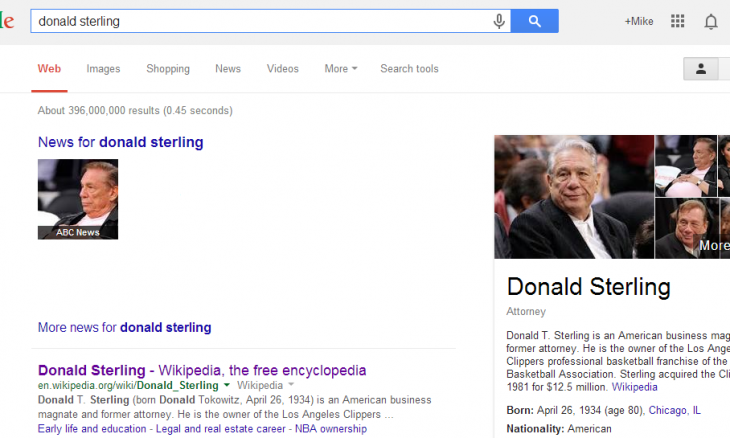If you have been following the news the last few weeks, you’ve seen an incredible change in the way individuals can control what kind of information Google returns about them. First an EU court ruled that Google must offer citizens the right to block information and then Google responded by placing a form that allows those requests to be made. There are plenty of explanation of how it works–here is a good one from Danny Sullivan–so I won’t belabor the basics here. What is really interesting is what might happen next.
Will Donald Sterling apply for EU citizenship? OK, that was snarky, but that is the only way he can get the search results shown in the photo above. Many people would love to use white-out on results that they believe are unfair and defamatory, but it is yet to be seen how this plays out in real life. Clearly, erroneous charges and other misinformation has become a problem for many people–and companies–but what constitutes misinformation is clearly a matter of opinion. No one really knows how this will play out, but it seems clear that the balance of power has changed for good.
The Internet has always been a wild west of information and misinformation, with search engines arbitrating visibility based on what’s popular rather than what is correct. (I have always described it as Family Feud rather than Jeopardy.) Usually that works–misinformation usually gets corrected quickly–but when people have axes to grind, anything goes.
Yahoo! has said that it is reviewing the ruling. Bing hasn’t commented, but both search engines (as well as other search engines) might be forced to go along with this now that Google has. The ruling applies to all search engines with a presence in the EU.
Governments and courts know that they don’t understand technology, so when laws and rulings come down, they are always concerned that maybe what they are demanding isn’t possible or might be very hard or expensive to do–or unpopular with the public. They don’t act that way, but they don’t want to look stupid or bad for business. The fact that Google complied so quickly makes it far more likely that this ruling will stick, that other governments will pile on, and that all search engines will need to comply worldwide.
Could it go farther than people? Maybe. Some countries, such as the U.S., have laws that essentially treat corporations as persons. It is not unthinkable that corporations might at some point get the same rights to bury information that EU citizens have won.
Google has always fought hard (and often lost) these battles over censorship but we will see how big an effect this actually has.






